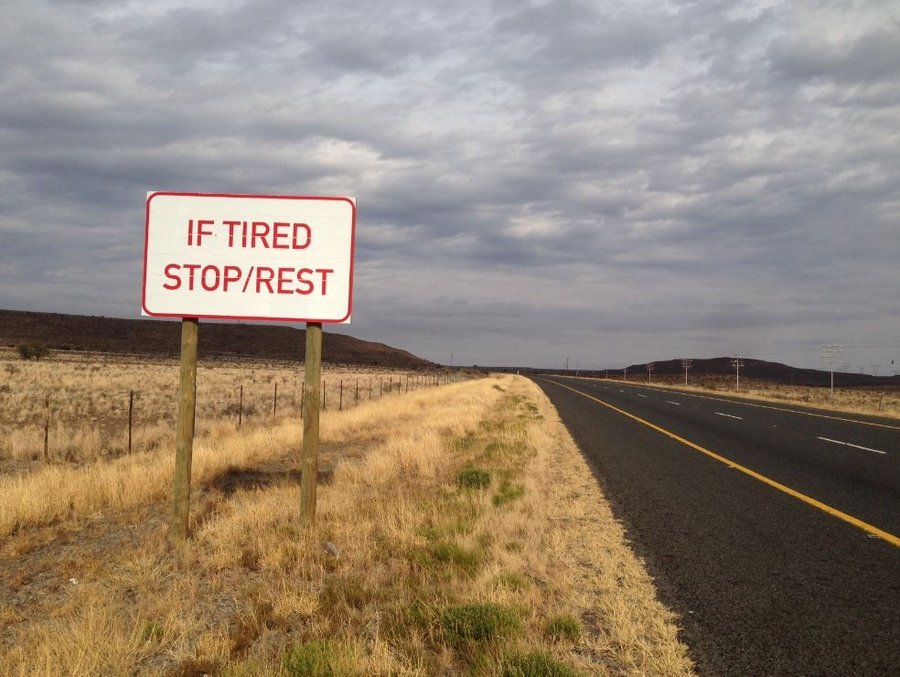Besides a minor indiscretion here and there, you consider yourself a pretty decent driver. After all, it's not like you've had any accidents in more than a decade, and you'd never, ever, ever drive drunk. News flash, oh confident traveler: if you've driven drowsy, it's just as bad as downing a six-pack of beer before getting behind the wheel and driving yourself home.
The Stats on Driving Drowsy Yep, it's true. A recent study in Australia, among other research, determined that driving after remaining awake for 18 hours is the same as driving with a blood alcohol concentration (BAC) of .05. After 24 hours of sleep deprivation? Think impairment at the level of a .10 BAC. That's like being legally drunk, as the legal limit in most states is .08. Fortunately, there's no breathalyzer for sleep deprivation, so you won't get arrested for swerving just because you've pulled an all-nighter. Still, at least 100,000 accidents get reported every year as the result of driver fatigue.
The toll equals an estimated 1,550 fatalities, 71,000 injuries and $12.5 billion in financial losses. Shift workers, commercial drivers and people with conditions like sleep apnea are most likely to get into these sleep-related crashes. Nevertheless, drowsy driving is a common problem. An NSF survey in 2005 reported that 60 percent of adults had driven a vehicle while tired in the last year, and one-third of these drivers had fallen asleep at the wheel. Sometimes, though, you just can't help it. You didn't even realize how exhausted you were until you got on the highway, and there's no convenient place to pull off. Look no further, intrepid driver. Here are ten helpful tips for staying awake when you have no choice but to drive on limited sleep.
1. Drink Caffeine It's no myth that caffeinated beverages can give you energy. A 75-milligram serving of caffeine, which is about equivalent to the amount in a cup of coffee, has been shown in studies to significantly increase attention. Chances are you'll pass a few gas stations and probably even more Starbucks stores. Drop in for a cup-a-joe or, if you're not a coffee drinker, perhaps a large cup of green tea.
2. Take a Mid-Trip Power Nap You didn't get the seven or eight hours of sleep you wanted last night, but don't underestimate the benefits of napping. According to the NSF, even a 20-30-minute power nap can increase your short-term alertness, improve your mood and sharpen your performance. Just make sure you pull over to a safe location, such as a well-populated parking lot, if you're going to nap in your car.
3. Use the Buddy System Sure, this isn't always possible if you're driving solo on your way home from work, but on long road trips, it can help to split the driving with a friend. That way, you'll each get the chance to snooze when it's your turn to lie back in the passenger seat.
4. Take Your Time It may seem like the sooner you get to your destination, the better, because then you can finally relax. However, don't travel at unsafe speeds when you're tired – you’ll only be putting yourself and your passengers in more danger. Better to follow traffic laws and arrive safely than drive quickly and never make it.
5. Plan Your Time Wisely If possible, plan your drive so you can avoid being behind the wheel in the wee hours of the night. Research with commercial truck drivers has shown that drowsiness is eight times more likely between midnight and 6 a.m. than during other times of the day.
6. Chew Gum Long-haul truck drivers often chew gum during trips to keep their mouths busy when they're feeling sleepy. Chewing gum will help prevent you from yawning when you're on the road. Just make sure you buy the sugar-free kind, because you definitely don't want a sugar crash.
7. Listen to Upbeat Music Turn the station – or your MP3 player – to music that's fast-paced and will keep you rocking out behind the wheel. As much as you may be a classical music aficionado, the middle of a drowsy drive is not the time to enjoy those soothing strings on the airwaves.
8. Open a Window A cool wind in your face, whipping around the car and creating some consistent background noise, can go a long way in preventing you from nodding off during your commute.
9. Take Plenty of Breaks On a long road trip, make sure to keep your body moving by pulling over every two hours or so to get out of the car and stretch. This will keep your blood flowing and help you conquer the next leg of your drive.
10. Avoid Medications That Cause Drowsiness Don't add to your exhaustion on the road by trying to take over-the-counter or prescription medications that have been linked to drowsiness. If you really need the pills, you can swallow them when you arrive at your destination.
Get a Good Night's Sleep! Though these tips will help get you through a long drive when you're not feeling the most alert, they're no substitute for a good night's sleep. Although not always possible, a healthy amount of sleep on a regular basis will enhance not just your performance when you're driving, but also your overall quality of life. So go ahead, hit the snooze button a couple of times while you're still comfortably under the covers. Your destination will still be there when you wake up. Promise.

